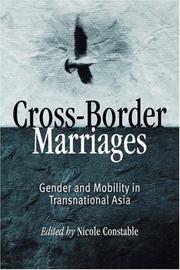| Listing 1 - 3 of 3 |
Sort by
|
Book
ISBN: 0295804386 9780295804385 9780295992228 0295992220 9780295992235 0295992239 Year: 2012 Publisher: Seattle : University of Washington Press,
Abstract | Keywords | Export | Availability | Bookmark
 Loading...
Loading...Choose an application
- Reference Manager
- EndNote
- RefWorks (Direct export to RefWorks)
Lijiang, a once-sleepy market town in southwest China, has become a magnet for tourism since the mid-1990s. Drawing on stories about taxi drivers, reluctant brides, dogmeat, and shamanism, Emily Chao illustrates how biopolitics and the essentialization of difference shape the ways in which Naxi residents represent and interpret their social world.The vignettes presented here are lively examples of the cultural reverberations that have occurred throughout contemporary China in the wake of its emergence as a global giant. With particular attention to the politics of gender, ethnicity, and historical representation, Chao reveals how citizens strategically imagine, produce, and critique a new moral economy in which the market and neoliberal logic are preeminent.
Post-communism --- Naxi (Chinese people) --- Moso (Chinese people) --- Moso (Tribe) --- Mosso (Chinese people) --- Na-hsi (Chinese people) --- Na-khi (Chinese people) --- Nahsi (Chinese people) --- Nakhi (Chinese people) --- Ethnology --- Tibeto-Burman peoples --- Yi (Chinese people) --- Postcommunism --- World politics --- Communism --- Social life and customs. --- Economic conditions. --- Government relations. --- Lijiang Shi (China) --- Lijiang Diqu (China) --- Social conditions. --- Ethnic relations. --- Post-communisim --- S11/0497 --- S11/1223 --- Economic conditions --- Government relations --- Social life and customs --- China: Social sciences--Society since 1976 --- China: Social sciences--Noso, Naxi
Book

ISBN: 9780812200645 Year: 2010 Publisher: Philadelphia
Abstract | Keywords | Export | Availability | Bookmark
 Loading...
Loading...Choose an application
- Reference Manager
- EndNote
- RefWorks (Direct export to RefWorks)


ISBN: 9780812200645 9780812218916 Year: 2010 Publisher: Philadelphia, Pa University of Pennsylvania Press
Abstract | Keywords | Export | Availability | Bookmark
 Loading...
Loading...Choose an application
- Reference Manager
- EndNote
- RefWorks (Direct export to RefWorks)
| Listing 1 - 3 of 3 |
Sort by
|

 Search
Search Feedback
Feedback About UniCat
About UniCat  Help
Help News
News